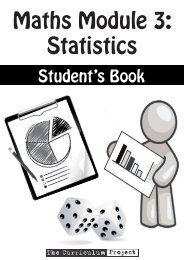Students worksheet 38 â September 2009 - The Curriculum Project
Students worksheet 38 â September 2009 - The Curriculum Project
Students worksheet 38 â September 2009 - The Curriculum Project
You also want an ePaper? Increase the reach of your titles
YUMPU automatically turns print PDFs into web optimized ePapers that Google loves.
Learning with <strong>The</strong> Irrawaddy, No. <strong>38</strong><br />
To accompany the <strong>September</strong> <strong>2009</strong> issue of <strong>The</strong> Irrawaddy magazine.<br />
Selected article: A Visit to Chinatown<br />
A. Activities before reading<br />
Activity 1<br />
Activity 2<br />
Discussion<br />
a) What different ethnic groups live in your area?<br />
b) Who is the majority group? Who are the<br />
minority?<br />
c) Which groups are wealthy? Which groups are<br />
poor?<br />
d) How do the majority groups feel about the<br />
minority groups?<br />
e) How do the poor groups feel about the rich<br />
groups?<br />
Cartoon<br />
Look at the drawing on the right:<br />
a) What do you notice about the place in the picture?<br />
b) Based on this picture, write a definition of ‘Chinatown’.<br />
Activity 3<br />
Activity 4<br />
Vocabulary<br />
Match the following words with the correct definition<br />
1. Colleagues (n)<br />
2. Bounded (adj)<br />
3. Sentiment (n)<br />
4. Boom (n)<br />
5. Bastion (n)<br />
6. Influx (n)<br />
7. Quota (n)<br />
a. A time of economic well being<br />
b. a set number<br />
c. people you work with<br />
d. an inward flow<br />
e. located within specific limits or<br />
boundaries<br />
f. a strong and safe place<br />
g. feeling, beliefs or judgements<br />
Vocabulary Practice<br />
Fill in the blanks to practice using your new vocabulary<br />
In July <strong>2009</strong>, there was an (a)________ of refugees into the country. <strong>The</strong> President<br />
decided there must be a (b)___________ on the number of people who could enter the<br />
country as refugees. “This country is a (c )_______ for our people!” he said. Because<br />
the refugees all needed to buy new things, there was a (d)_________. <strong>The</strong> President<br />
made some money but he was not happy. In fact, he had no (e)________ at all. He<br />
used the money to make his country (f)____________ by barbed wire. His<br />
(g)__________ told him it was a bad idea, but he didn’t listen.<br />
<strong>The</strong> <strong>Curriculum</strong> <strong>Project</strong> <strong>2009</strong>
B. Activities during reading<br />
Activity 5<br />
Reading Comprehension<br />
a. Look at the map on the last page and mark where Chinatown is located in<br />
downtown Rangoon.<br />
b. What percentage of downtown Rangoon does the author say is occupied by<br />
Chinatown?<br />
c. When was Chinatown created?<br />
d. What are some advantages of Chinatown?<br />
e. What are some disadvantages of Chinatown?<br />
f. Where do most Chinese immigrants come from?<br />
g. How many Burmese live in Rangoon? How many Chinese?<br />
Activity 6<br />
Activity 7<br />
Summaraising<br />
Match the one-sentence summaries to the paragraph number they best describe.<br />
a) <strong>The</strong> government has not placed any limit on the number of Chinese<br />
immigrants allowed into Burma.<br />
b) Chinatown has vibrant street life, which attracts many people.<br />
c) Burmese culture is at risk of becoming overwhelmed by the growing influence<br />
of Chinese culture.<br />
d) Some people blame the government but other people say everyone is<br />
responsible for preserving Burmese culture from outside influences.<br />
e) Chinatown is quite large, quite old and is full of many kinds of businesses.<br />
f) Some people worry that eventually there will be too many Chinese people in<br />
Rangoon and it will become like Mandalay.<br />
g) It seems likely that the growing number of Chinese immigrants will continue<br />
to rise.<br />
h) Some residents of Rangoon enjoy Chinatown for its food.<br />
i) <strong>The</strong> government won’t do anything to stop the Chinese in Burma because the<br />
Chinese government supports the Burmese regime.<br />
j) Chinese business owners in Chinatown have been very successful.<br />
k) <strong>The</strong>re are many Chinese migrants in Mandalay and many Chinese businesses.<br />
l) Because businesses have been successful in Chinatown, more Chinese<br />
migrants are setting up there.<br />
m) Chinese immigrants don’t cause problems in other countries, so living together<br />
is possible.<br />
n) Chinatown has the benefit of being culturally different than the rest of<br />
Rangoon.<br />
o) Despite the good food in Chinatown, it is still important to keep Burmese<br />
culture alive in Rangoon.<br />
Topic Sentence<br />
Pick the topic sentence which best describes the main idea of the article:<br />
a) Chinatown is a good place to eat food and own a business.<br />
b) <strong>The</strong> Burmese culture in Rangoon may be lost to Chinese influence.<br />
c) <strong>The</strong> Burmese regime should do more to stop Chinese immigrants.<br />
d) Mandalay is too Chinese.<br />
<strong>The</strong> <strong>Curriculum</strong> <strong>Project</strong> <strong>2009</strong>
c) Activities after reading<br />
Activity 8<br />
Interpreting Quotes<br />
Match the quote with the person who said it and how they feel.<br />
1. “I’m not choosy, so long as the<br />
Discussion food ok.”<br />
2. “I started this street-side restaurant<br />
with two tables 30 years ago but<br />
Identify the main point<br />
my business has grown and<br />
grown.”<br />
3. “We should keep in mind that<br />
they’re going to swallow us up<br />
What’s sooner happening? or later.”<br />
4. “Rangoon will be no exception.<br />
<strong>The</strong>re’s nothing to stop the<br />
Chinese coming and no way to<br />
stem their increasing influence.”<br />
5. “<strong>The</strong> junta doesn’t want to do<br />
anything to upset the Chinese<br />
Communist government, which<br />
shields them from international<br />
pressure.”<br />
6.<br />
Discussion<br />
“<strong>The</strong>re are many Chinese who live<br />
a) in other countries who live<br />
b) harmoniously with their hosts. We<br />
c) just have to work harder to make<br />
d) sure we keep control over what<br />
e) matters and preserve our culture.”<br />
f)<br />
a. An old Burmese man.<br />
b. <strong>The</strong> oldest Burmese man.<br />
c. A Chinese woman near 50<br />
years old.<br />
d. <strong>The</strong> third Burmese man<br />
e. <strong>The</strong>ingi.<br />
f. A second old Burmese<br />
man.<br />
I. … is sure that Rangoon will be taken<br />
over by the Chinese, like Mandalay.<br />
II. …thinks that Burmese people need<br />
to work harder to keep their culture<br />
safe from the Chinese.<br />
III. … thinks Burmese culture is in<br />
danger from Chinese culture.<br />
IV. … thinks Chinese influence is good<br />
and has benefited from it.<br />
V. … has no opinion if Chinese is better<br />
than Burmese.<br />
VI. … thinks the government should do<br />
more to stop Chinese from coming to<br />
Burma but the government isn’t.<br />
Activity 9<br />
Place each speaker’s opinion on the scale below:<br />
Pro-Chinese<br />
Anti-Chinese<br />
6<br />
Activity 10<br />
Bias<br />
A good journalist researches important issues and explores all sides to the issue so<br />
that the reader can make up his or her mind. When journalists do this, we can say that<br />
they are balanced or un-biased.<br />
Look at the previous activity and answer these questions:<br />
a) Did the journalist write a balanced article? How can you tell?<br />
b) Which side does the journalist favour?<br />
c) What kind of information would make this article more balanced?<br />
<strong>The</strong> <strong>Curriculum</strong> <strong>Project</strong> <strong>2009</strong>
Activity 11<br />
Journalism<br />
Imagine that you are a journalist in Pakistan who is doing research on new refugees<br />
from Afghanistan. As part of your research you interviewed many people. <strong>The</strong>ir<br />
interviews are recorded below.<br />
. Pick which three quotes you will use to write the most balanced article about<br />
refugees you can.<br />
“I have tried everything for my<br />
family. I have tried to keep them<br />
safe and give them food. I have<br />
worked until I was weak from<br />
working. It hurts not to be able to<br />
provide for my family, but that is<br />
the truth. I have tried everything<br />
and now I must beg for help and<br />
permission to live in this strange<br />
new country.”<br />
Hakim, Afghan goat herder<br />
(69 years old)<br />
“It really is too bad what is<br />
happening in Afghanistan. I take<br />
pity on all the people there who<br />
have lost their homes. <strong>The</strong>y have<br />
really gone through some terrible<br />
suffering. We should feel proud<br />
to be able to offer those people<br />
somewhere safe to recover while<br />
our politicians work hard to help<br />
bring peace to Afghanistan.”<br />
Ghazala, Pakistani school<br />
teacher (32 years old)<br />
“We don’t want charity<br />
or people feeding us. We<br />
just want an opportunity<br />
to contribute to society.<br />
We want to work, we<br />
want jobs and we want a<br />
safe place for our<br />
children to go to school<br />
and grow up.”<br />
Hadiya, Afghan<br />
farmer (22 years old)<br />
“We must be very careful about<br />
how we offer aid to our<br />
neighbours from Afghanistan. If<br />
we give too much, it will make<br />
the refugees lazy. <strong>The</strong>n they will<br />
not want to work the fields at<br />
home because it is a hard life.<br />
Instead they will want to live here<br />
in the refugee camps in Pakistan.<br />
We must provide assistance, but<br />
in a careful and thoughtful way.”<br />
Hussein, Pakistani shop owner<br />
(<strong>38</strong> years old)<br />
“Our people should stay in<br />
their own country to fight for<br />
what they believe in and<br />
defend their homes. If<br />
everyone becomes a refugee,<br />
there will be no one to fight<br />
and those with the most<br />
weapons will win. <strong>The</strong>n, there<br />
will be no where to go home<br />
to.”<br />
Amina, Afghan school teacher<br />
(56 years old)<br />
“We should welcome<br />
our Afghani brothers<br />
and sisters with open<br />
arms. <strong>The</strong>y need all the<br />
help and support we can<br />
give them in this difficult<br />
time.”<br />
Salim, Pakistani<br />
university student (21<br />
years old)<br />
“All Afghans are lazy people<br />
looking for free food. We should<br />
give them nothing!”<br />
Bahaar, Pakistani (75 years old)<br />
“We must absolutely refuse to allow these people into our<br />
country. <strong>The</strong>y will eat all our food and take all our jobs. Life<br />
is difficult enough for us Pakistanis without us giving all our<br />
hard-earned food to strangers. Let them find their own food!”<br />
Malika, Pakistani mother of three children (43 years old)<br />
Activity 12<br />
Research<br />
Brainstorm a list of issues which are important to your community today. Issues are<br />
topics which people have very different opinions about so make sure to brainstorm<br />
topics about which people disagree.<br />
Brainstorm a list of interview questions you might ask if you were a journalist who<br />
wanted to know about people’s opinions on the issue.<br />
Interview at least ten different people in the community about their opinions. To be<br />
sure you are getting a balanced picture, make sure you talk to many different kinds of<br />
people (old, young, male, female, etc). When you are finished, put a check mark<br />
beside the three quotes you would use to write a balanced article about the issue.<br />
<strong>The</strong> <strong>Curriculum</strong> <strong>Project</strong> <strong>2009</strong>
A Visit to Chinatown<br />
1<br />
2<br />
3<br />
4<br />
5<br />
6<br />
7<br />
8<br />
Chinese influence is growing in Rangoon, but not everyone is happy about it<br />
“I’m not choosy, so long as the food is okay,” said <strong>The</strong>ingi when asked if she<br />
preferred Burmese or Chinese restaurants. Hungrily tucking into some grilled<br />
pork ribs at a sidewalk food stall, she said she hadn’t really thought about<br />
whether she had any anti-Chinese feelings, adding that she came with her<br />
colleagues to eat in Rangoon’s Chinatown several times a month.<br />
Chinatown—which translates as “Tayote Tan” in Burmese—is attracting<br />
people like <strong>The</strong>ingi, because, as in most cities where the Chinese have built a<br />
distinctive quarter, it offers a refreshing contrast to local culture.<br />
First created by the British when they expanded the city in the 1850s,<br />
Rangoon’s Chinatown is bounded by Mahabandoola and Shwedagon Pagoda<br />
Road to the north and east, and Strand Road and Shwedaungdan Street to the<br />
south and west, respectively. Occupying about a fifth of the city’s downtown<br />
area, the crowded streets are packed with restaurants, gold and jewelry<br />
stores, game centers, cyber cafés, fashion shops, mini-marts, food stalls and<br />
fruit vendors.<br />
Though not officially called Tayote Tan, the area is known as such by those<br />
who throng its vibrant street life. For the present it seems to matter little to<br />
most people what, if any, anti-Chinese sentiment there may be. For them,<br />
Chinatown is a place to go.<br />
“I started this street-side restaurant with two tables 30 years ago, but my<br />
business has grown and grown,” said a Chinese woman in her early 50s as<br />
she prepared lunch for her customers. Today she owns five sidewalk food<br />
stalls and two fruit shops, and with the money earned she has bought two<br />
apartments for her children in Chinatown and one in Hlaing Tharyar, on the<br />
outskirts of the city.<br />
<strong>The</strong> boom in business and rising property values has made Chinatown a<br />
center for Chinese migrants, but in a teashop nearby a group of Burman men<br />
saw the increasingly prosperous quarter as a threat to the former capital.<br />
“We should keep in mind that they’re going to swallow us up sooner or<br />
later,” said an elderly Burmese man, warning that Rangoon’s residents should<br />
consider how the face of Mandalay, the country’s second largest city, has<br />
changed.<br />
<strong>The</strong> last bastion of the Burmese kings before the entire country fell to Britain<br />
in 1885, Mandalay has fallen sway to a new wave of outsiders—Chinese<br />
migrants. <strong>The</strong> growing Chinese community in Mandalay continues to attract<br />
migrants from Yunnan Province in southwestern China, who are now deeply<br />
involved in many sectors of the local economy. Chinese-owned hotels,<br />
guesthouses, restaurants and small businesses have sprung up, and Chinese<br />
festivals are firmly embedded in the city’s cultural calendar.<br />
<strong>The</strong> <strong>Curriculum</strong> <strong>Project</strong> <strong>2009</strong>
9<br />
10<br />
11<br />
12<br />
13<br />
14<br />
15<br />
<strong>The</strong> men agreed that the influx of Chinese migrants and their growing<br />
influence was probably unstoppable.<br />
“Rangoon will be no exception,” one of them said. “<strong>The</strong>re is no reason to stop<br />
the Chinese coming and no way to stem their increasing influence. <strong>The</strong>y have<br />
settled all over the country, and it would be impossible to root them out.<br />
Rangoon’s 6.4 million Burmese are bound to fall under their influence.”<br />
Another man thought the situation was made worse by the military<br />
government, which has no quota for Chinese migrants entering the country.<br />
“<strong>The</strong> junta doesn’t want to do anything to upset the Chinese Communist<br />
government, which shields them from international pressure,” he said.<br />
While many blame the military government for allowing the Chinese to come<br />
in such numbers, the oldest in the group said it was up to the Burmese not to<br />
let outsiders get too much influence.<br />
“<strong>The</strong>re are many Chinese in other countries who live harmoniously with their<br />
hosts,” he said. “We just have to work harder to make sure we keep control of<br />
what matters and preserve our culture.<br />
“I enjoy going to Tayote Tan every now and then, but I wouldn’t want every<br />
town in Burma to look so Chinese,” the old Burman said.<br />
<strong>The</strong> <strong>Curriculum</strong> <strong>Project</strong> <strong>2009</strong>



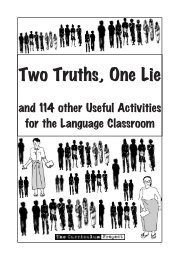
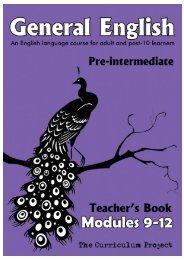
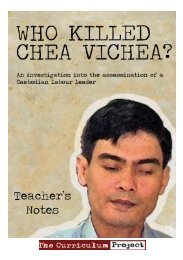
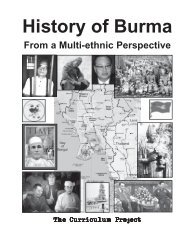


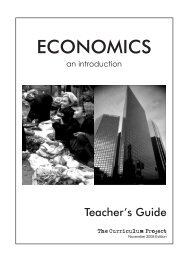
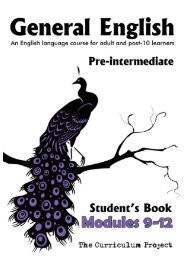


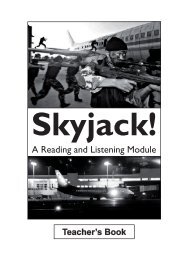
![[Eng] Nov 2012 DRAFT - The Curriculum Project](https://img.yumpu.com/45590859/1/184x260/eng-nov-2012-draft-the-curriculum-project.jpg?quality=85)


